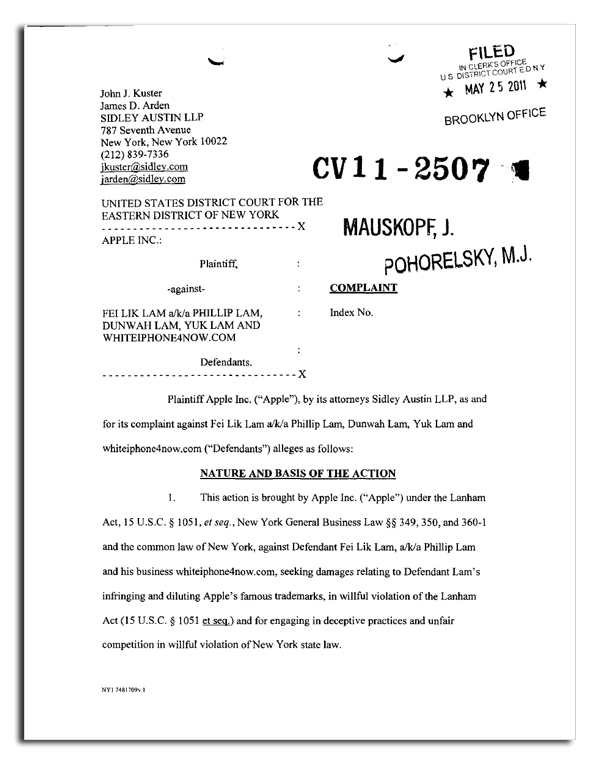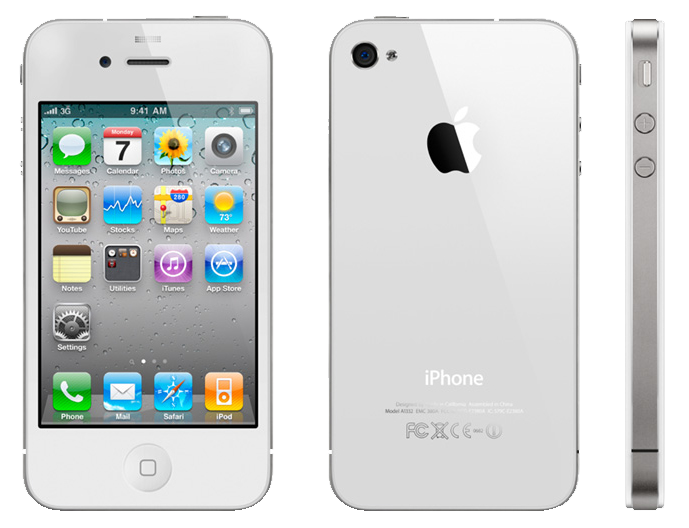Apple files, dismisses suit against teenager who sold white iPhone 4 kits
Filed this week in U.S. District Court for the Eastern District of New York, Apple's complaint comes against Fei Lik "Phillip" Lam and his parents, Yuk Lam and Dunwah Lam. Their son created the website "whiteiphone4now.com," where he sold tools and materials that allowed customers to modify a black iPhone 4 and make it white.
The site has been offline since Apple issued a cease-and-desist letter on Dec. 1, 2010. Prior to that, Lam's service served a niche of enthusiasts who wanted to have Apple's long-delayed white iPhone 4 but could not yet buy it. The need for such extraordinary measures became largely negated last month when, after months of delays due to production issues, Apple finally began to sell the white iPhone 4.
But as noted by MacRumors, Apple also filed for a voluntary dismissal at the same time. That has led to speculation that Apple and the Lam family may have reached a settlement out of court. Apple's dismissal gives the company the right to refile the claim if it so chooses, leaving Lam potentially on the hook again.
The complaint accuses Lam of "infringing and diluting Apple's famous trademarks" through the sale of his conversion kits, which included parts obtained from Apple's overseas manufacturing partners. The kits included white front and black panels branded with the Apple logo and iPhone trademarks.
Apple's lawsuit states that Lam obtained the parts from an "unauthorized supplier in Shenzhen Province int he People's Republic of China." This "supplier" bought the white panels from shops on the streets of Shenzhen, and Apple argues that Lam "knew" where the parts came from.
Lam is alleged to have contacted Alan Yang of Shenzhen, who operates the business "Focusupply." Apple claims to have obtained an instant message conversation between Yang and Lam, in which Yang said his company had a "friend" at manufacturing company Foxconn.
"Defendant at all times knew that Apple has never authorized the sale of white panels for its iPhone 4 mobile devices, and that he obtained these parts from sources that were not authorized by Apple or any of its suppliers to sell them," the complaint reads.
Lam's parents are included in the complaint, as Apple believes they "aided and abetted" their son, who was a minor when the alleged trademark infringement occurred. Apple seeks to recover damages, including the "illegal profits" Lam obtained from his online business, which were reportedly more than $130,000 as of November 2010.
It was last fall when Lam first gained attention for making six figures from buying white iPhone 4 replacement parts from overseas, and building his own models of Apple's smartphone. Apple co-founder Steve Wozniak also built his own white iPhone 4 using parts obtained from overseas, though he did not make a business out of selling them like Lam.
 AppleInsider Staff
AppleInsider Staff















 Amber Neely
Amber Neely
 Thomas Sibilly
Thomas Sibilly

 William Gallagher
William Gallagher
 Malcolm Owen
Malcolm Owen
 Christine McKee
Christine McKee










51 Comments
Suing little kids and their parents for doing the job you couldn't figure out how to do?
Perhaps Steve Jobs has been spending too much time hanging out with music execs?
Suing little kids and their parents for doing the job you couldn't figure out how to do?
Perhaps Steve Jobs has been spending too much time hanging out with music execs?
First off, that post is funny as hell.
Secondly, you need to "protect" your intellectual property, or risk losing you trademarks and patents, so they sort of had to sue, even if they always intended on dropping the suit.
Lam is clearly in the wrong even if we ignore the potential of Philip and his parents knowing these parts were illegally obtained from someone working at Foxconn. Imagine if Apple let anyone in any country sell stolen or trademark infringing products. Their business and name would be severely hindered. I think they could even lose their right to their trademark if they didn’t try to protect it.
That said, I can’t help but give this kid some cheers for his entrepreneurship and do hope that he got to keep some of the money he made.
PS: DIdn’t Steve Wozniak buy such a kit? Was it not from this seller?
PPS: Please don’t feed the trolls.
Apple wasn't selling the cases for a reason: they negatively effected performance. Apple also presumably owned the white cases it decided not to use. The cases probably were supposed to be destroyed. So, if it was the actual white cases intended to be used in iPhones, the kid was essentially selling Apple property.
Apple wasn't selling the cases for a reason: they negatively effected performance.
You?ll best clarify that before you get a rush of people claiming that a different piece of glass doesn?t change how fast the processor runs.